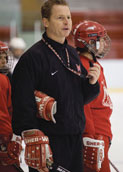McGill duo scales Olympic mountain
McGill duo scales Olympic mountain McGill University
User Tools (skip):
McGill duo scales Olympic mountain
On February 10, when the Canadian team marches into Stadio Olimpico for the opening ceremonies of the 2006 Olympic Games in Turin, Italy, there will be at least two participants on hand for whom having pride in the red and white will carry double meaning. And while current McGillians Dick Pound and Peter Smith have taken very different roads to reach the same lofty destination, both men exhibit a similar commitment and passion that can only be described as, well, Olympian.

Martlets' coach, Peter Smith, puts his team through their paces before leaving for Turin.
Andrew Dobrowolskyj
As with all sports stories, there is the veteran. When asked how many Games he has attended, McGill Chancellor Dick Pound answers "15 or so." His first experience, as a member of Canada's swim team at the Games in 1960, was heightened even more because it was held in Rome - Pound's first trip to Europe. "We came down from the clouds and I saw a city that I'd studied for so many years. Suddenly the Vatican and Coliseum were much more than just data points. It was the most wonderful experience."
Pound has eye on present, future
Pound is a builder and protector of the Olympic ideal whose vision both encompasses these Games and extends far beyond them. A member of the International Olympic Committee (IOC) since 1978, Pound will arrive in Italy a week before the Opening Ceremonies to attend a variety of pre-Games meetings. Other sessions will deal with more long-term objectives, such as the ongoing discussion into dropping either softball or baseball from the 2012 Games. A member of the IOC's marketing committee, Pound will also ensure that the needs of sponsors and broadcasters are well met.
Once the Games begin, Pound will don the hat of chairman of the World Anti-Doping Agency (WADA), an agency that will act as an independent observer of Turin's doping control process. WADA representatives will also interact directly with athletes to give them a better understanding of doping and to help them verify whether the vitamins and supplements they are taking are on the ever-growing list of banned substances.
Pound's never-give-an-inch attitude toward drugs in sports is well documented, most recently for his controversial assertion that as many as one-third of NHL players may be taking some sort of performance-enhancing drugs. While he admits that WADA is still playing "catch-up" with the cheaters, he believes the agency has narrowed the gap thanks to increased funding for research. "Testing is getting much more sophisticated," he says. "Now the perpetrators have to run on their own little treadmill to stay ahead of us."
If Pound is the lighthouse keeper whose eye is fixed firmly on the distant horizon, then Peter Smith studies a single tidal pool and all the minutiae within. As an assistant coach of Canada's women's hockey team, Smith doesn't have the luxury of a global vision. His goal is immediate and all-consuming: prepare the strongest Canadian team possible.
The Martlets' head coach will be on the proverbial hockey diet the moment he arrives in Italy at the end of January - eating, drinking and breathing nothing else for most of his stay. When not assisting in Team Canada practices, the Lachine native will be scouting opposing teams' games and practices, relying on his great eye for detail to assess strengths to diffuse and weaknesses to exploit.
At game time, Smith will be perched high above the rink in the press box or on the cat walk, communicating to another coach on the bench via headset as to what adjustments the team needs to make.
Of course, this type of commitment is nothing new to the 2002-2003 Canadian Interuniversity Sport (CIS) coach of the year who has guided the Martlets to the CIS national championship tournament in five of the last six seasons. Less than a week before heading to Italy, his mind is still focused on the here-and-now of the Martlets, a team battling it out with Concordia for top spot in Quebec. "Of course I'm very, very excited about going," he says in his rink-side office. "But it's not without some apprehension about leaving the team here. I'll be phoning and emailing to find out how things are."
Smith understands that this, his first Olympics, is an experience of a lifetime and one that he hopes will benefit the Martlets in the long run. "This is a great opportunity for me to see things at a different level. I want to take what I learn from my experience with the national team and apply it here at McGill."
Derek Drummond, interim director of athletics, believes Smith's selection to the national team was an obvious one. "Peter is totally committed to women's hockey," he says. "They couldn't find a better man to represent McGill and Canada."
Smith laughs when asked about the pressure of coaching a team that is favoured to win gold in the country's national sport. "We live in a country of 30 million hockey coaches," he smiles. "Whenever there's an election, so many people are undecided or don't have an opinion. But when it comes to hockey, everyone has an opinion."

